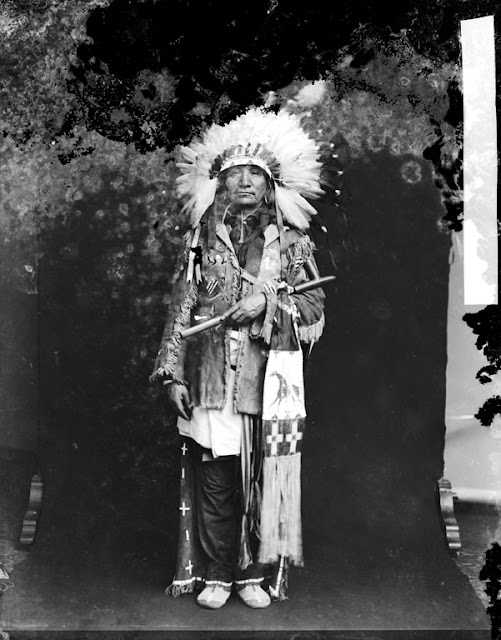Oglala Lakota Red Hawk
RED HAWK (Cetan Luta) – Sioux Oglala. Born in 1854
LAKOTA BELIEF AND RITUAL, pp 136-37: Red Hawk states that he was a Bear Dreamer and so acted as a healer. He had "a revelation from Wi", the Sun, meaning he had endured the Sun Dance and secured a vision. Indicating his Sun Dance scars, Red Hawk stated that because of them no Lakota would doubt his word. He also spoke about being a warrior, and that he was entitled to "wear the split eagle feather".
"Red Hawk, Oglala, went on his first war party at the age of eleven. He eventually participated in twenty battles, including the battle against Custer at the Little Bighorn in 1876. He fasted twice. The second time, after two days and a night, he had a vision of four women mourning as they circled the camp, followed by a warrior singing the death song. His grandfather then appeared to him and told him to arise. With that, he awoke. He looked eastward and saw the sun peeping above the horizon so he took his pipe and held it to the rising sun as he offered a prayer, “Let my people with glad hearts behold a good day.” Unfortunately, a few days later, four men were killed in a raid, and their wifes circled the camp mourning, while the survivor of the battle followed them, singing the death song"
 Biography
Biography"Born 1854. First war-party in 1865 under Crazy Horse, against troops. Led an unsuccessful war-party at twenty-two against Shoshoni. First coup when twelve horse-raiding Blackfeet were discovered in a creek bottom and annihilated. Led another party against Shoshoni, but failed to find them; encountered and surrounded a white-horse troop. From a hill overlooking the fight Red Hawk saw soldiers dismount and charge. The Lakota fled, leaving him alone. A soldier came close and fired, but missed. Red Hawk did likewise, but while the soldier was reloading his carbine he fired again with his winchester and heard a thump and "O-h-h-h!" A Cheyenne boy on horseback rushed in and struck the soldier, counting coup. Engaged in twenty battles, many with troops, among them the Custer fight of 1876; others with Pawnee, Apsaroke, Shoshoni, Cheyenne, and even with Sioux scouts.
Red Hawk fasted twice. The second
time, after two days and a night, he saw a vision. As he slept,
something from the west came galloping and panting. It circled about
him, then went away. A voice said, "Look! I told you there would be many
horses!" He looked, and saw a man holding green grass in his hand.
Again the voice said, "There will be many horses about this season";
then he saw the speaker was a rose-hip, half red, half green. Then the
creature went away and became a yellow-headed blackbird. It alighted on
one of the offering poles, which bent as if under great weight. The bird
became a man again, and said, "Look at this!" Red Hawk saw a village,
into which the man threw two long-haired human heads. Said the voice, "I
came to tell you something, and I have now told you. You have done
right." Then the creature, becoming a bird, rose and disappeared in the
south. Red Hawk slept, and heard a voice saying, "look at your village!"
He saw four woman going around the village with their hair on the top
of their heads, and their legs aflame. Following them was a naked man,
mourning and singing the death-song.
www.curtis-collection.com/curtis/Red%20Hawk.htm


Comments
Post a Comment